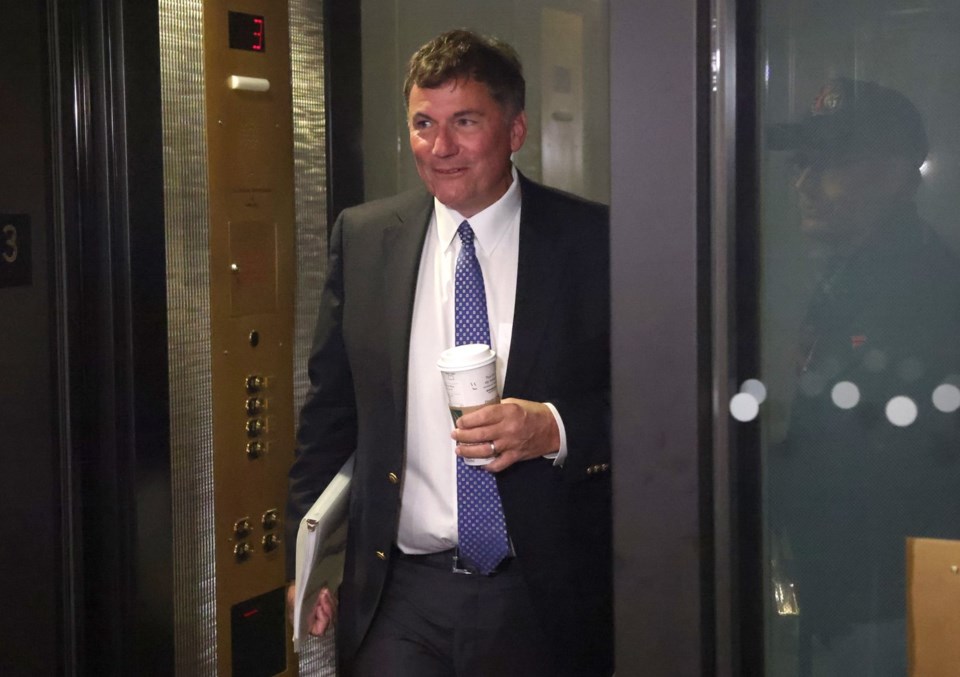WASHINGTON — Canada-U.S. Trade Minister Dominic LeBlanc said he left Washington Wednesday with a sense that progress was made after a meeting with U.S. Commerce Secretary Howard Lutnick.
"It was constructive in the sense it was an exchange of views that I think helped both us and the Americans understand the work we need to do to get, we hope, to an agreement," LeBlanc said in an interview with The Canadian Press after arriving in Montreal.
This week's progress came after Prime Minister Mark Carney announced on Aug. 22 that Canada will drop some retaliatory tariffs in an effort to intensify trade talks hoping to ease pressures from U.S. President Donald Trump's duties on key Canadian sectors.
LeBlanc said his meeting with Lutnick on Tuesday began with both sides commenting on the positive phone call between Carney and Trump on Aug. 21.
Carney has said that during the call Trump assured him dropping Canada's counter tariffs would help kick-start trade negotiations. Trump said it was a "very good call," adding he likes the prime minister.
Carney and Trump agreed last spring to negotiate a new economic and security partnership following the Canadian election in April. At the G7 leaders' summit in June, Carney said they were targeting a late-July deadline. Trump moved that unilaterally to Aug. 1.
Canadian officials had dampened expectations a deal would materialize and Trump boosted tariffs on Canada to 35 per cent. The White House cited the flow of fentanyl and Canada's retaliatory tariffs as justification for the increase.
The 35 per cent tariffs on Canada do not apply to goods compliant with the Canada-U.S.-Mexico Agreement on trade, called CUSMA. Ottawa's counter tariffs, targeting almost $30 billion in U.S. goods, did not initially exempt CUSMA compliant items but Carney said as of Sept. 1, they will.
Canada's counter-tariffs on steel, aluminum and automobiles will remain. The tariffs on automobiles generally align with the United States but Canada's counter-tariffs on steel and aluminum remain at 25 per cent, despite the U.S. raising its rate to 50 per cent in June.
LeBlanc spent around 90 minutes with Lutnick at the United States Department of Commerce, where they spoke about specific proposals and items that have been put on the table.
LeBlanc said it was longer than expected because they were "exchanging views on a number of questions that frankly we want to try and resolve as quickly as possible."
LeBlanc and the Trump administration have agreed to keep the content of the conversations private. The minister added that both sides are working in good faith.
"The tone continues to be constructive and I think collaborative," LeBlanc said.
Negotiations about more technical aspects will now continue between Canada's Ambassador to the U.S. Kirsten Hillman — who is also Canada's chief negotiator — and United States Trade Representative Jamieson Greer.
Carney has said Ottawa's focus is to see Trump's tariffs on steel, aluminum, automobiles, copper and lumber reduced. Speaking in Latvia Tuesday, Carney said "in order to do that … we will have to look at other areas where we can have win-win co-operation."
LeBlanc has previously said he's talking to Americans about "a package of stuff" that can include investment opportunities in areas like defence and security.
Canadian officials are also looking to soften tensions ahead of a looming review of the continental trade pact.
CUSMA was negotiated during the first Trump administration to replace the North American Free Trade Agreement. It is up for review next year and negotiations are expected to start this fall.
LeBlanc said the goal remains a bilateral agreement before the CUSMA talks begin but Ottawa will only agree if it's what's in the best interest of Canada.
"We still have some work to do with the United States in a number of areas," he said.
This report by The Canadian Press was first published Aug. 27, 2025.
Kelly Geraldine Malone, The Canadian Press



